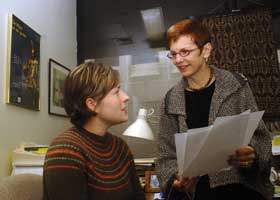For more archives, go to the Advance Archive/Search Page.
Final-Year Projects Build on Medical
Students’ Skills, Interests
Wanted: Husband – A Romantic Comedy about Love, Obesity and Diabetes.
Although it may sound like the latest comedy show on cable TV, it’s actually the title of a book written by UConn medical school graduate Dr. Rada Jones ’04 to fulfill one of her graduation requirements. The novel is not only packed with humor and romance, but is also filled with medical facts and health information.
Jones’s book was part of the medical school’s fourth-year course that requires students to develop independent projects – known at the Health Center as “selectives” – that are related to research, education, or community health intervention.
When the book was complete, Jones asked students, faculty, and people in the community to read it, and then quizzed them on its medical content.
 |
Fourth-year medical student Christine Trapp, Left, meets with Judy Lewis, director of community-based education at the school of Medicine, to discuss her independent 'selectives' project. |
“A great deal of thought and personal effort goes into a selectives project,” says Judy Lewis, selectives course director and professor of community medicine at the UConn School of Medicine. “It plays an important role as a capstone experience in the education of our medical students, by allowing them to build on previous interests and skills, integrate what they’ve learned during their first three years of medical school and their future career interests into an independent project. We are impressed each year with their creative ideas and energy.”
Some of the past projects include: creating an educational video for fifth-graders; evaluating physicians’ use of herbal medications; assessing pain levels in patients with dementia; preparing an analysis of wrist fracture risk in snowboarders; and studying the role of medicine in the media. More than 300 projects have been completed by medical students since selectives were introduced as a component of the School’s medical education in the 1999-2000 academic year.
Students who choose research projects must show that their work can improve clinical programs and community health. Sharpening their research skills and methodologies, students develop an experimental design, analyze data, and have the opportunity to collaborate with colleagues from a variety of fields and subspecialties.
“As health care providers, research skills are important for physicians,” says Lewis. “A research selective provides a significant opportunity for students to develop, conduct, and analyze independent research.”
At the end of their projects, students describe the results of their research in a journal article format and give a formal presentation.
A selective in education prepares students for educational roles in communities, academic teaching, patient instruction, and continuing education. It increases their understanding of the educational process, broadens their teaching experiences, hones organizational and problem-solving skills, promotes collaborative work, and prepares them for teaching roles as physicians. Students have the opportunity to observe different teaching styles and learn about making presentations to various audiences. They can also become involved in nontraditional teaching methods, using video, fiction, and puppet shows as educational tools.
Currently, fourth-year medical student Rob Elder is working on a communications project. He would like to write a series of newspaper articles about such topics as newborn screening programs, prenatal testing of genetic syndromes, and breast and ovarian cancer. “I think the articles could be educational for the general public because all of the topics are of interest to a wide audience,” he says.
Students who choose a project in the area of community health learn more about certain groups or populations and gain a fuller understanding of the social and cultural factors that affect health and health care. They also develop skills in dealing with community health problems and become aware of resources within the community.
Public health is an important component of the medical school’s curriculum, says Lewis. “Physicians need to be knowledgeable about the communities in which they practice, and the best way to learn that is through personal involvement. A community-based selective gives students the opportunity to concentrate their efforts on a specific intervention and population.”
For their selectives project, Drs. Sarah Schlegel and Christine Skurkis, medical school graduates in the Class of 2003, developed a health education curriculum and taught the course at the American School for the Deaf in West Hartford. They recruited new medical students to continue the program at the ASD, and it is now a recognized community service program of the medical school. Students working in the program are trained in basic sign language skills and use an interpreter to provide health education to ASD students.
Projects conducted by the Class of 2004 included initiating a smoking cessation program for homeless women; providing osteoporosis screenings for elderly men; providing glucose screenings for pregnant women; comparing menopause symptoms in Caucasian and Hispanic women; and investigating the use of acupuncture for children. Currently, students are involved in projects such as developing inpatient nutrition protocols; stratifying syphilis risk; creating virtual patient encounters; classifying neonatal sepsis; and preparing an elective on global literature and women’s health.
“The goal of medical education is to produce a graduate who is knowledgeable in the practice of general medicine and who has been introduced to a variety of clinical specialties and subspecialties,” says Lewis. “Being a physician also encompasses the roles of researcher, educator, and advocate for community health. The selectives course provides students with the opportunity to establish in-depth practical knowledge in one of these areas.”

